- Home
- Georgette Heyer
The Conqueror Page 4
The Conqueror Read online
Page 4
‘The fool lacks a whipping,’ Grimbauld said, and turned back to pick over the meat on his platter with his thick, short fingers.
Raoul’s eyes had followed the jester to the fire, watching curiously how Galet threw himself down beside one of the hounds, and murmured his nonsense into a cocked ear. Galet shook the bells in his cap, and muttered, and glanced about him with many odd grimaces, and a hunching of his crooked shoulders. When he saw Raoul looking at him he grinned his sad, half-witted grin, and began to rock himself about, hugging his body in his arms. Raoul wondered what clouded thoughts troubled the fool’s brain. He tossed a scrap of meat to him, and jester and hound fell on it together, wrangling each one alike with growls and bared teeth.
A stir at the high-table made them all look round. The Duke had risen, and was on his way to the twisting stair that led to the gallery and the rooms above. He had paused to listen to his cousin of Burgundy, who had intercepted him with a hand on his shoulder in the familiar way he always used. He still held his haggard on his wrist, and still absently smoothed her plumage with his finger, but his glance was on Guy’s face, impassive and unsmiling. A shaft of sunlight slanting down through a window set high up in the wall touched with gold his crisp black locks, and glinted on a ring he wore upon the stroking finger. His uncle Walter, a solid man of middle years, stood a little on one side, waiting for him to finish with Guy.
‘See the noble tanner’s son!’
The softly spoken words just reached Raoul’s ears. They had been uttered by Grimbauld, and as Raoul looked quickly round at him he saw the scarred lip twisted into a sneer. It was of no use to pay any heed to such whisperings. Ever since he had come to Court Raoul had heard them, covert jibes directed at the Duke’s base kindred: Walter, the tanner Fulbert’s son; Walter’s son William; and, not less, the Duke’s own half-brothers, Robert and Odo, children born to Herleva by her marriage with Herluin, knight of Conteville. They were both present now: Robert a few years younger than the Duke, a heavy boy with a dogged, open face; and Odo, his junior, brighter-eyed, and readier of tongue. They waited beside their father at the bottom of the table, but the Duke had spoken with them on their way to the stair, and again Raoul had caught a vague murmur of dissatisfaction, so faint that he could not locate whence it came.
Still standing by the bench he watched the Duke walk to the stairway, and go up it, with Walter following him. Guy of Burgundy lounged back to his place at the table, and called to a server to fill up his cup.
There had been silence while the Duke was on his way out, a puzzling silence fraught with some emotion Raoul could not understand. Up at the Duke’s table two barons exchanged fleeting glances as they resumed their seats. Again Raoul knew an instant’s feeling of unrest, as though in that quick enigmatic look he had seen danger. A gleam in Grimbauld’s narrowed eyes that were fixed so intently on the Duke made him catch his breath. Something in the concentration of Grimbauld’s gaze made him feel uneasy, afraid of a danger he could not see.
Two days later the hunting-party was on the road, the Duke riding at the head of his cavalcade, with the Burgundian beside him. He had business at Bayeux, so that the first day’s ride was to the north, and short. They swept into Bayeux at the dinner hour, and were received by the Bishop, by Ranulf de Bricassart, Viscount of Bressin, and by several other lords of the district. Once more a disquieting feeling stole over Raoul. As he slid down from Verceray’s back, and saw the Duke walk forward between strangers to the door of the palace, he could have sworn that danger lurked in the air. So acute was this premonition that he was almost uncontrollably urged to run after the Duke with an absurd warning to him not to stop in this grey town with its twisted streets, and furtive corners. He fought back the impulse, and just as he had satisfactorily argued away his fears, there was Galet bestriding his mule, and grinning at him as though he knew what suspicious thoughts had crossed his mind.
‘Fool, you haunt my footsteps,’ he said irritably.
Galet slid down from the mule’s back. ‘Why then, I am as good as your conscience, cousin, and thereafter more fool than I knew. Where is my brother William?’ He saw the Duke in the doorway of the palace, and laughed shrilly. ‘Propound me this riddle, Cousin Raoul: which is the wolf, and which the sheep of those yonder?’ He pointed to the group about the Duke, and twisted his face into a leer.
Raoul looked where Galet pointed. ‘Truly, you are right,’ he said. ‘They have a very wolfish look, those men.’
‘“Oh what a clever boy is mine!” cried your mother when you tried to grasp the candle-flame. Brother Raoul, Brother Raoul, did you ever hear the tale of the wolf that put a sheepskin over his shoulders?’ He poked his bauble at Raoul’s ribs, and went off after the Duke with another of his empty crows of laughter.
At Bayeux the Duke’s retinue was quartered in the palace for the one night they were to stay in the town. When supper was over, and the trestles were cleared away, pallets were spread on the floor, and all but the nobler lords lay down to sleep there. The horn-lantern at the foot of the stairs cast a feeble glimmer of light over the bottom steps; where Raoul lay the red glow of a dying fire lit the floor of the hall.
Waking from an uneasy sleep in the quiet of the night he saw a shadow on the stairs, and jerked himself up on his elbow. In the dim light he could see the hump of a man’s shoulder, the outline of the head laid on a folded cloak. Someone at the far end of the hall was snoring; the man next to Raoul shifted on his pallet with a grunt and a sigh. The shadow on the stairs moved again, and the lantern-glow faintly illumined the face of the jester. He sat huddled against the wall, and as he moved his head into the light Raoul caught the gleam in eyes that were very wide awake.
Raoul threw back the cloak that covered him, and rose up cautiously in his shirt and hose. He had to grope with his foot to save himself from treading on sleeping forms as he crossed the hall, but he made no sound, and woke no one in his stealthy progress towards the stairway.
Galet hailed him in a whisper. ‘Do you find your pallet hard, brother?’
Raoul stood with one foot upon the stair, gravely looking down at him. ‘Why do you watch?’ he asked. ‘Is your pallet so hard you cannot sleep?’
‘Nay, nay, Galet is a good dog,’ the fool answered. He clasped his body in his long arms and looked up at Raoul with an expression half sad, half roguish.
Raoul glanced over his shoulder, as though he expected to see someone standing there. He dropped down on to his knee on the stair, and brought his lips close to the fool’s ear. ‘Speak! What is it you fear?’ he whispered.
Galet smiled, and rocked himself sideways. ‘Not you, brother.’ He put out his hand and touched Raoul’s knee with his bauble. ‘Take my bauble, fool. “I will not be afraid of shadows,” quoth the goat when he saw a wolf lurking in the thicket.’
Raoul grasped at his shoulder, and shook him. ‘Speak out, fool! What danger threatens?’
The fool rolled his eyes, and lolled out his tongue. ‘Nay, do not shake poor Galet’s wits out of him. Go and sleep, brother: what danger should threaten such a lusty calf as you?’
‘None. But you know something. Who means ill towards the Duke?’
The fool gave a mocking laugh under his breath. ‘There was once a peacock, brother, lived in a noble lord’s park, and when men exclaimed continually at the beauty of his plumage he grew vain, and fancied himself greater than the lord who fed him, and imagined, in his folly, that he could drive out the noble lord and rule over the park in his stead.’
Raoul nodded rather impatiently. ‘Stale talk, fool. All Normandy knows that the Burgundian grows large in his own mind. No more?’
Galet threw him a sidelong look. ‘Plots, plots, brother: dark deeds,’ he said.
Raoul glanced up the stairway. ‘Can you speak no word of warning, you who sit at his feet?’
The fool showed his big teeth in a mirthle
ss grin. ‘Did you ever warn a heron to beware the hawk, brother?’
‘The heron needs no warning,’ Raoul said, frowning.
‘Yea, yea, my little William is a sage heron,’ crooned Galet, and began to play with his fingers like a half-wit. ‘Yet he bears a hooked beak. Can a heron do so, Cousin Raoul?’
‘I am sick of your riddles,’ Raoul said. He stood up, chilled by the night air striking through his shirt. ‘Watch on. Four eyes may see further than two.’ He went creeping back to his pallet, and began to dress himself. The rings of his mail tunic clinked as he pulled it over his head, and the man beside him stirred and muttered in his sleep. He buckled on his sword, and wound the bindings up his legs over the loose hose. When he picked his way to the stairs again he was fully clothed even to the helmet on his head.
‘What a brave knight is this!’ chuckled Galet. He made room for Raoul to pass him. ‘William my brother, you are well-served.’ He watched Raoul go up the stairs. ‘Sleep sound, William,’ he muttered. ‘He has a keen nose, your new watchdog.’
When the dawn-light stole into the castle it showed sleeping forms on the floor, harsh faces softened in slumber, and swords lying beside straw pallets. Upon the stairs the jester was curled up with his head pillowed on his arm, dozing uneasily. Outside a shut door that opened on to the gallery above a young knight stood with his hands folded on his naked sword. He stood very still, but when some slight noise reached him from below he turned his head to listen more intently, and his fingers closed tighter on the sword-hilt.
The light grew warmer, and with the rising of the sun new sounds broke the stillness. Scullions began to move about in the kitchen, and from outside came the stir of the waking town.
With a sigh, and a stretching of weary limbs, Raoul left his post. Down in the hall the men still slept, but Galet was awake, and patted him between the shoulders. ‘Good dog Raoul!’ he chuckled. ‘Will he throw a bone to his two hounds, our master William?’
Raoul yawned, and rubbed his hand across his eyes. ‘Fool, in the clear daylight I ask myself, am I also a fool?’ he said, and passed on out of the hall into the sunlight.
On this second day’s ride they struck westwards along the coast until the rivers that separated the Bessin from the Côtentin were forded. The way led northward after that over wild country, and through many straggling forests. Adulterine fortalices looked down from every hill, each one a potential menace to the peace of Normandy. Unfriendly this land seemed, unlike Raoul’s own province of the Evrecin.
Valognes itself lay on the edge of a forest, and the dwelling set aside for the Duke’s use was scarcely more than a hunting-lodge, easy of access, and with no fortifications. Besides the hall it possessed one or two solars built in the thickness of the wall upstairs, and round the main building, in a rude court, were a cluster of ramshackle wooden houses. In one of these were quartered the few men-at-arms; another accommodated the Duke’s scullions, cooks, valets, and huntsmen; and there was a third, somewhat larger, which was used as a stable for the destriers. Horses belonging to the less fortunate were haltered under a thatched roof supported on posts. Here Raoul had to see Verceray bestowed. As at Bayeux, the knights made what shift they could in the hall of the main building for sleeping-room, but Raoul, whose suspicions had not been lulled by what he had seen of the country and the people of the Côtentin, snatched what rest he could by day, and every evening when the torches were quenched, and the household slept, he took up his post outside the Duke’s door, and remained there throughout the night. He felt an odd pleasure in these vigils. This was service, and even though the Duke neither knew of his devotion, nor ever noticed him above his fellows, he was content, and felt through the long, still hours a queer bond tightening between him and the young man who slept, secure because of his watch, behind the shut door.
The Duke hunted the beasts of the forest and the warren, and flew his hawks at the brook and at the heron, and conducted all the business that had brought him into the Côtentin with the firmness and dispatch that was as yet strange to his nobles. His grip on affairs seemed to be masterly; little escaped him, and he left little to chance. Yet if he saw so much, Raoul wondered, how could he be blind to the signs of hostility all round him? No one could misread these signs: the barons of the district held aloof; of his own attendants men whispered in corners, and when he went abroad he was accompanied by fewer knights than those who crowded round the handsome Guy of Burgundy.
One might have thought that this smiling prince was the ruler of Normandy. His train of satellites was numerous; he swaggered it royally in velvet and jewels, and used towards William an affectionate manner that was not untinged by the patronage of an elder cousin. The knights hung round him, and because he laughed gaily, and scattered largesse with a lavish hand, the common people always raised a cheer for him when he passed.
Raoul hated him. When he saw him charming William’s knights away from him, when he heard him impudently usurping ducal privileges or acknowledging homage that was due to William, he raged inwardly, and wondered with a kind of sick disgust why the Duke bore with him, and never seemed to notice his graceful insolence. It was almost as though the stronger character dominated the weaker, but no man looking at the two faces could think William the weakling of the pair.
Here, at Valognes, Raoul’s dislike for the Burgundian grew, and into it crept distrust. It was no secret that Guy had pretensions to the throne of Normandy, but until now Raoul had not imagined that these were anything more than the grumblings of a dissatisfied young man. So many seigneurs had objected to their base-born Duke, and there had been so many who asserted greater claims to his coronet that it was nothing extraordinary to hear murmurings amongst Guy’s court that it was he and not William who should be the ruler of Normandy.
But now Raoul’s suspicions were stirred, and he began to watch Guy. There were secrets abroad; he had seen a note slipped into the Burgundian’s hand by one who seemed only to pass him on the stair, and once he had run against a stranger in the dark passage upstairs. The man had come out of Guy’s room like one who did not wish to be observed, and in the torchlight Raoul had seen dust of hard travel on his clothes. Later he had met him at supper, when it appeared that the stranger was come to Valognes on quite innocent business. But why, Raoul asked himself, had he been closeted with Guy of Burgundy; and why did he look confused when he had stumbled on Raoul in the passage?
There befell an incident in the forest which kindled all his suspicions to a flame. In company with Guy, De Bohun, Grimbauld du Plessis, and some few knights and huntsmen, the Duke had gone out after bear. Raoul was in his train, staying as close to him as he dared, for the thought darted across his mind, when he saw of what doubtful men the party was composed, that if treachery were meditated this gloomy forest would be no such bad place for the execution of a dark deed. All the morning they had followed the hounds on a hot trail, under the shade of giant trees, and through dense thickets, further and further into the lost heart of the forest. The hounds had led them to their quarry, a big surly brown bear, and while they bayed and worried him the huntsmen stayed on the edge of the clearing, only the Duke, by his own desire, ready to run in to deliver the spear-thrust that would end the combat.
The hounds were all around the bear, slashing at his flanks and heavy quarters, bewildering him, and rousing him from sulkiness to a massive rage. He fought them with his teeth, and his great paws. One of the bitches went over and over with a broken back; a rache, running in unwarily, crawled away dragging his hind-quarters and leaving a trail of blood in his wake.
William was eagerly watching his moment. Raoul had hardly ever seen him in so animated a mood. His eyes sparkled, and he urged on the hounds continually, shouting out hunting cries, and chafing for an opportunity to run in and engage with the infuriated beast himself.
When the opportunity came he advanced quickly, grasping his spear, and struck with all hi
s might where the neck joined the shoulder. It was an admirable thrust, but the bear had swung suddenly away, lunging at one of the hounds with a murderous rake of his forearm, and the spear was deflected slightly, and struck the shoulder. As the head went home there was heard the snap of a breaking shaft. A sort of sigh went up from the group of watching men. The Duke let a great oath, and sprang back, casting the broken shaft away from him. A fallen tree-branch lay across the ground, and caught his heel. He fell heavily, and the bear, shaking himself momentarily clear of the pack, came at him in a lumbering rush.
In that dreadful moment, and even as he raced across the clearing to cut the bear off from William, Raoul realized that not one of the men behind him had made a movement to go to the Duke’s rescue.
He ran desperately. A hound, darting in, had closed his fangs on the bear’s shoulder, but though he checked he could not turn the brute. The instant’s respite allowed Raoul to fling himself between the beast and the man. William had leaped to his feet, and was tearing the fleshing-knife from his belt, but it was Raoul who struck the final blow, a true thrust, deep and sure.
‘Back, beau sire! back!’ he shouted.
The bear seemed to lurch forward, and fell with a crash, and a gush of blood at nostrils and mouth.
Others came hurrying up. Had they really hesitated, or had he only imagined that they held back? Mechanically wiping his spear, Raoul watched Guy of Burgundy clasp William affectionately, and heard him say: ‘Cousin, cousin, why would you not let another man take that risk? Christ’s wounds! if the brute had reached you!’
Raoul felt an insane desire to laugh. He moved away from the group round the Duke, shaken by the shock of having seen his master helpless before a horrible death, and out of breath from his own headlong rush to the rescue. He wiped the sweat from his face with an unsteady hand, angry with himself for being so easily discomposed. Then he saw William put the Burgundian aside, very much as a man might push away a troublesome puppy, and walk with his quick, yet deliberate step towards him.

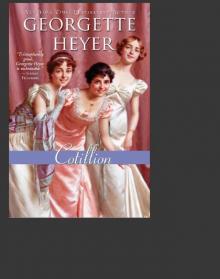 Cotillion
Cotillion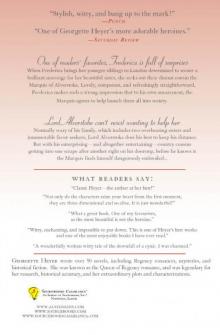 Frederica
Frederica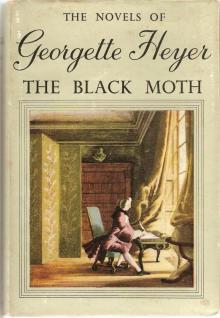 The Black Moth: A Romance of the XVIIIth Century
The Black Moth: A Romance of the XVIIIth Century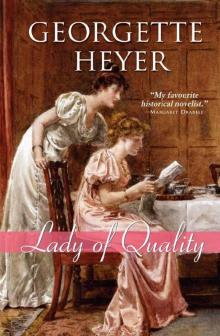 Lady of Quality
Lady of Quality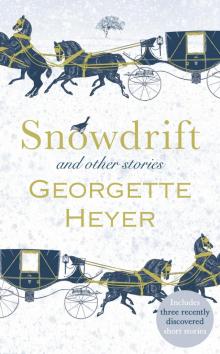 Snowdrift and Other Stories
Snowdrift and Other Stories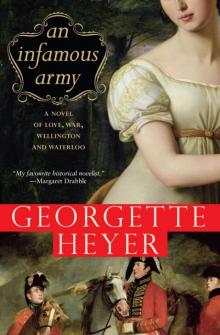 An Infamous Army
An Infamous Army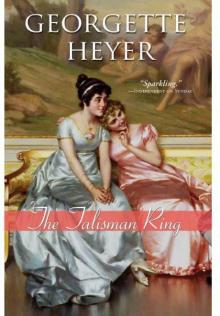 The Talisman Ring
The Talisman Ring Venetia
Venetia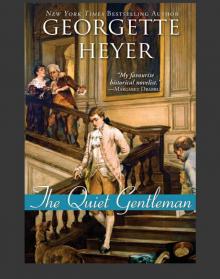 The Quiet Gentleman
The Quiet Gentleman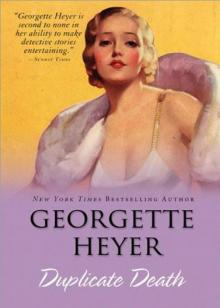 Duplicate Death
Duplicate Death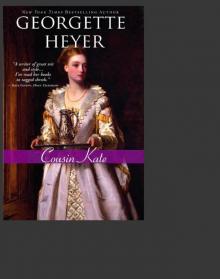 Cousin Kate
Cousin Kate Black Sheep
Black Sheep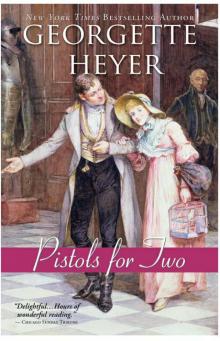 Pistols for Two
Pistols for Two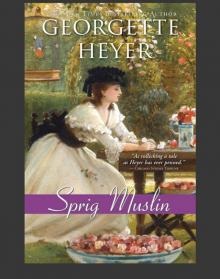 Sprig Muslin
Sprig Muslin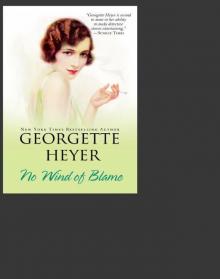 No Wind of Blame
No Wind of Blame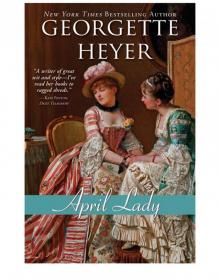 April Lady
April Lady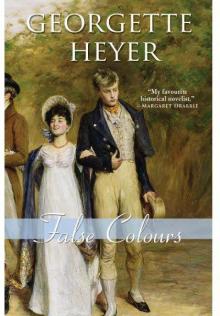 False Colours
False Colours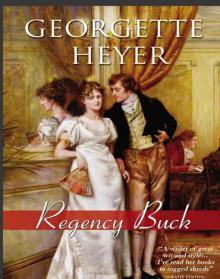 Regency Buck
Regency Buck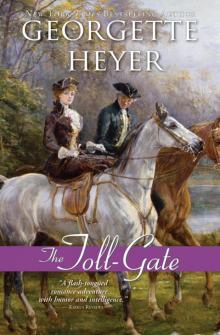 The Toll-Gate
The Toll-Gate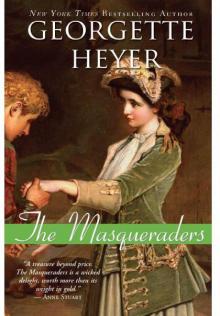 The Masqueraders
The Masqueraders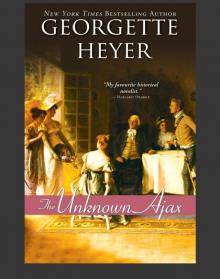 The Unknown Ajax
The Unknown Ajax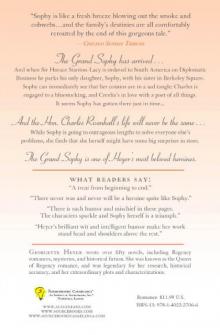 The Grand Sophy
The Grand Sophy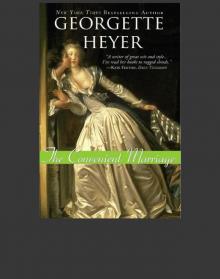 The Convenient Marriage
The Convenient Marriage Faro's Daughter
Faro's Daughter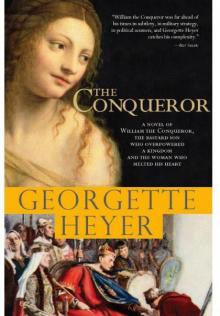 The Conqueror
The Conqueror The Foundling
The Foundling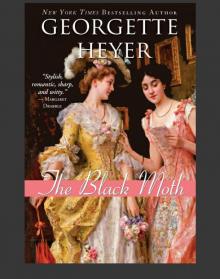 The Black Moth
The Black Moth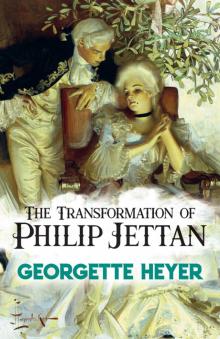 The Transformation of Philip Jettan
The Transformation of Philip Jettan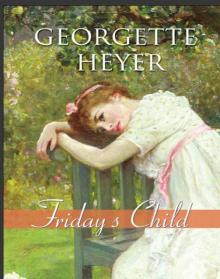 Friday's Child
Friday's Child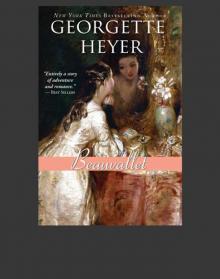 Beauvallet
Beauvallet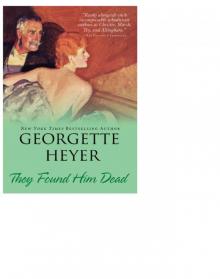 They Found Him Dead
They Found Him Dead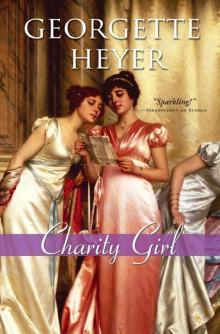 Charity Girl
Charity Girl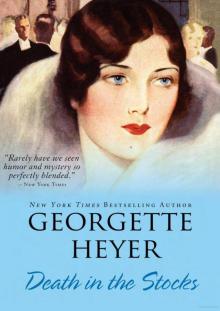 Death in the Stocks: Merely Murder
Death in the Stocks: Merely Murder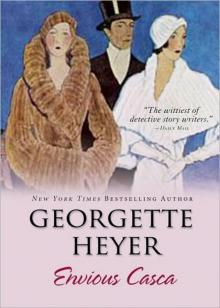 Envious Casca
Envious Casca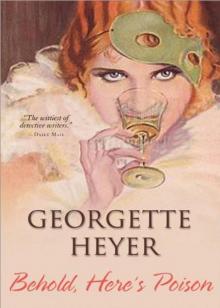 Behold, Here's Poison
Behold, Here's Poison Arabella
Arabella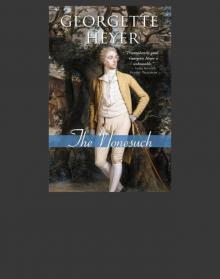 The Nonesuch
The Nonesuch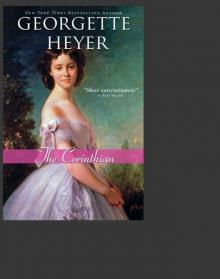 The Corinthian
The Corinthian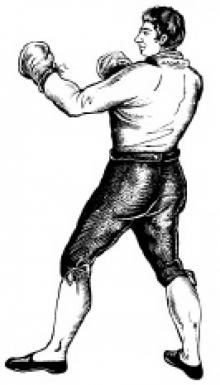 Jennifer Kloester
Jennifer Kloester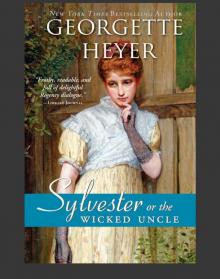 Sylvester
Sylvester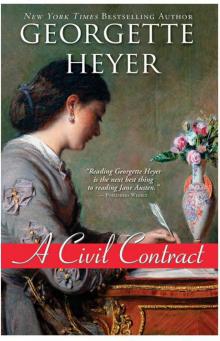 A Civil Contract
A Civil Contract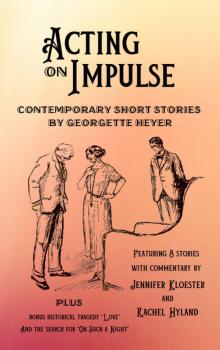 Acting on Impulse
Acting on Impulse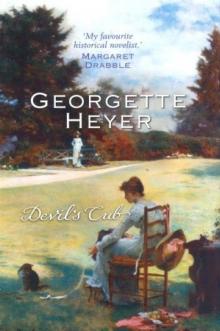 Devil’s Cub at-2
Devil’s Cub at-2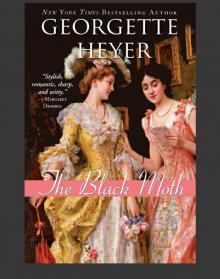 Black Moth
Black Moth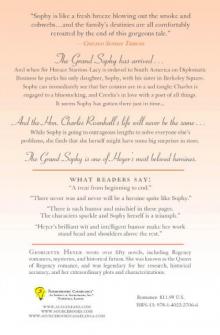 Grand Sophy
Grand Sophy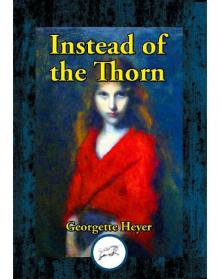 Instead of the Thorn
Instead of the Thorn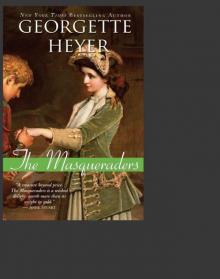 Masqueraders
Masqueraders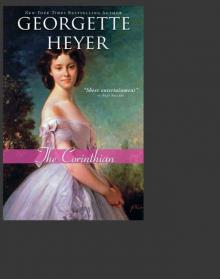 Corinthian
Corinthian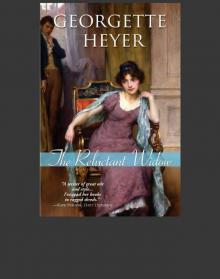 Reluctant Widow
Reluctant Widow